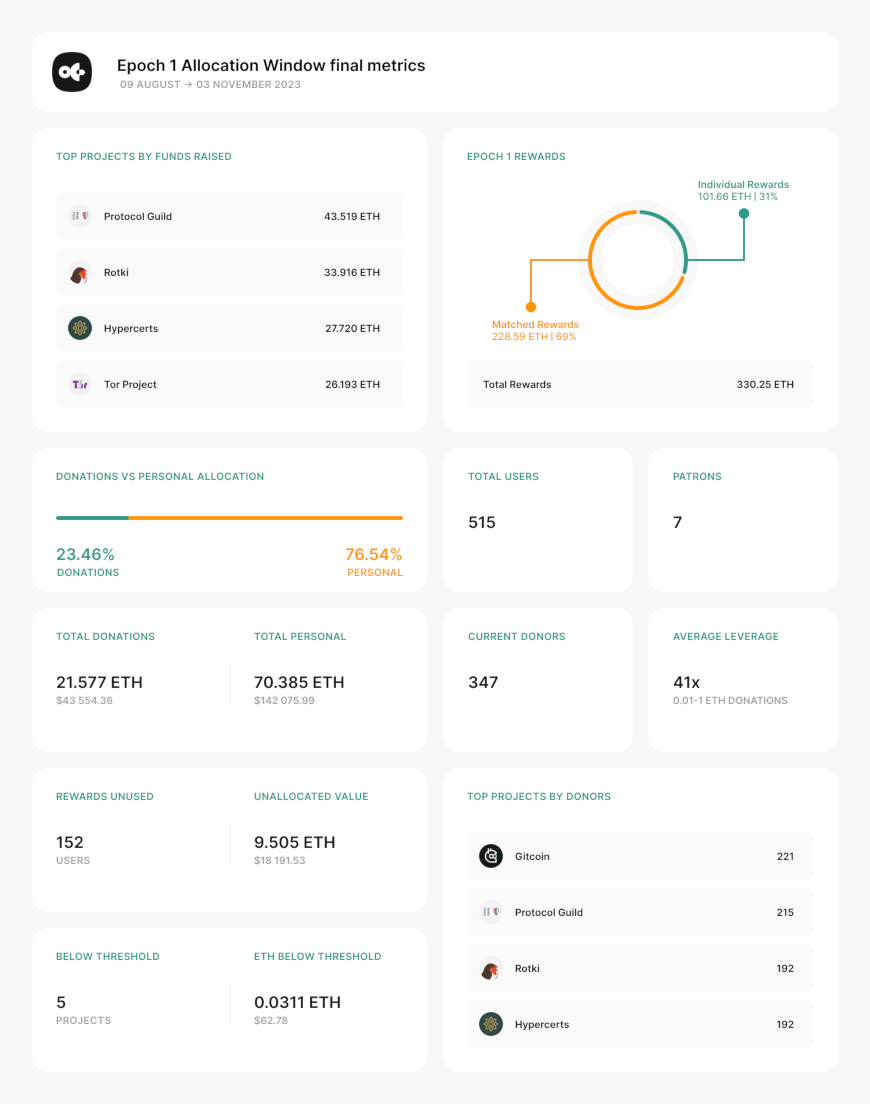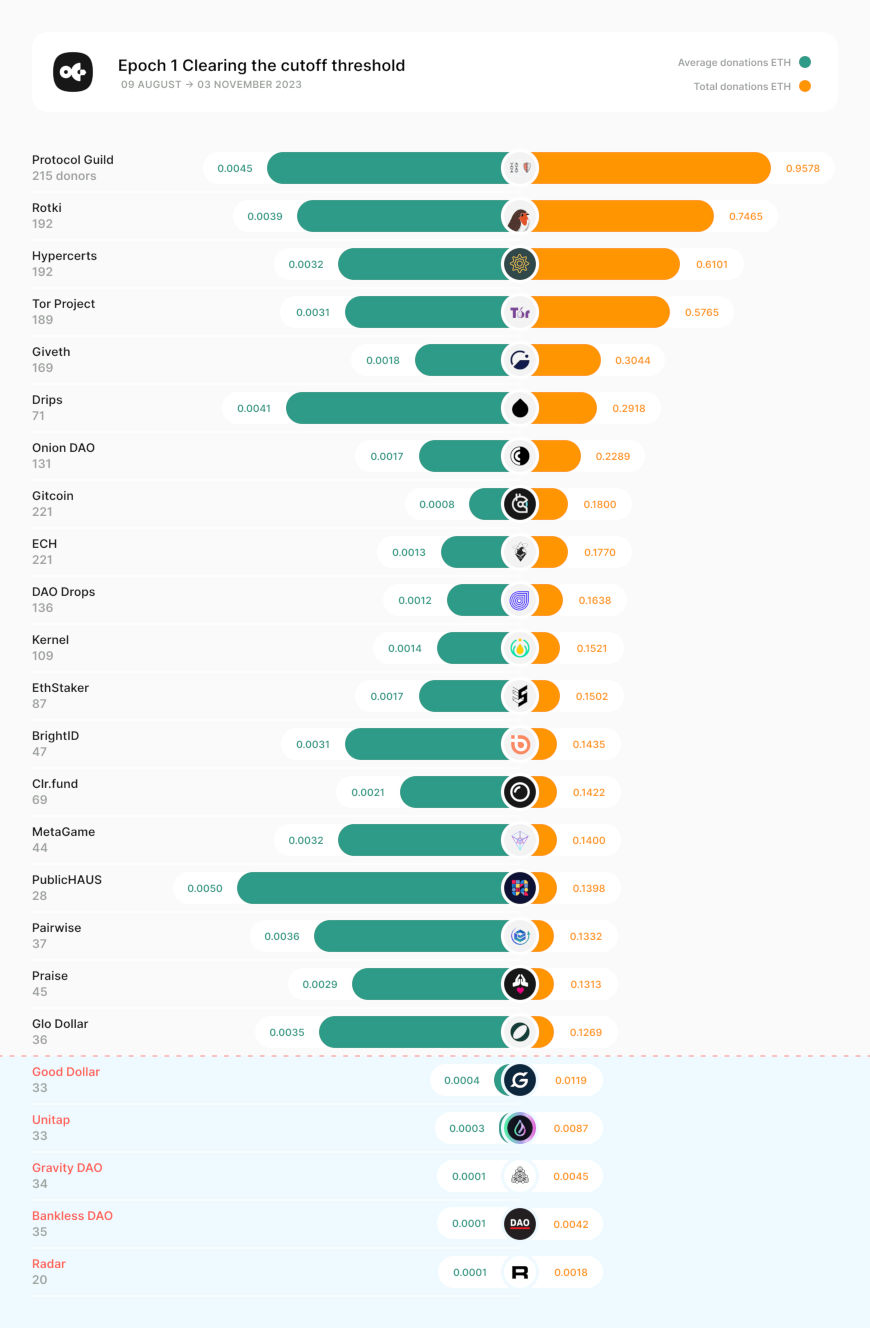Epoch One Allocation Window: A Look Back and What’s Ahead
The Epoch One Allocation window has concluded, marking two exhilarating weeks! The Octant community has allocated a total of 330.25 ETH in rewards and in the process supported 19 high-impact public goods projects. Massive thanks to everyone who jumped in on this exciting part of our journey! Take a deep dive with us into how things went, what we’ve learned, and where we are heading next (If you’re looking for a TL;DR, just take a look at the graphs and read the sections in bold).

Epoch One Overview
The Epoch One Allocation window was open to participants who locked at least 100 GLM into Octant’s smart contract and maintained their lock-in long enough to qualify for rewards by the end of the epoch.
Users in control of 515 addresses were eligible to participate in the allocation of Octant’s budget for Epoch One. The holders of these addresses were tasked with distributing 330.25 ETH in Total Rewards, with 101.66 ETH allocated towards Individual Rewards and 228.59 ETH directed to the Octant Matching Fund.
Octant mandates active participation: to have a claim on individual rewards, eligible users needed to log into the Octant app with their GLM-locking address while the allocation window was active (i.e. during the two weeks from October 19th to November 2nd) and decide how to allocate their share of the rewards.
They had three choices: to claim the rewards for themselves, donate partially or entirely to pre-approved public good projects, or to contribute the full amount to the Octant Matching Fund through Patron Mode. Inaction would result in the forfeiture of user rewards, which would then go back to the Golem Foundation.
User Engagement and Impact
By the close of the Allocation Window, users managing 363 addresses had made allocation decisions. 152 did not act and thus forfeited their rewards.
Of the 101.66 ETH in Individual Rewards:
- 69% were claimed by users,
- 16% were directed to the Matching Fund,
- 6% were donated to public goods projects,
- 9% (~9.5 ETH) went unclaimed and returned to the Golem Foundation.
To incentivize contributions to public goods projects, Octant employs an ingeniously designed matching funding mechanism. The leverage of Octant’s matching funds inversely correlates with the community’s donation rate. This means a lower rate of donations triggers a higher boost for individual contributions, ensuring that each donation remains impactful, even if numerous users opt to retain their rewards. In Epoch One, individual donations to shortlisted projects were amplified by an average factor of 41!
It is important to note, however, that this matching funding was exclusively applied to projects that met the minimum funding threshold. Presently, this threshold is set at 1/2n, where ‘n’ represents the number of shortlisted projects. With 24 projects in the running for Epoch One, each needed to secure at least 1/48th of the total donations to be eligible for matching funds from the Octant Matching Fund. The final funding threshold was established at 0.1151 ETH.
A crucial factor in securing community funding was the ability of Octant users to adjust their allocations dynamically during the active allocation window. Community members were encouraged to regularly monitor the progress of their chosen projects and reallocate funds as necessary to help their favored initiatives exceed the funding threshold. Among the participants, individuals overseeing 117 wallets elected to revise their allocations at least once. Eleven users made two changes to their allocations, six made three, another six made four, and a handful of users adjusted their allocations over 10 times since their initial distribution. The most involved participant remarkably altered their allocation a total of 39 times!
The Funded Projects
Ultimately, 19 out of 24 projects hit the funding threshold and received community donations in Epoch One. Detailed descriptions of each project can be found in the Octant app. As part of the application process, all projects applying for Octant community funding had to outline to the community their intended use of the requested funds. Their proposals can be found on the Octant Discourse forum.
Below is the list of Epoch One’s funded projects and their respective amounts raised:
- Protocol Guild: 43.5192 ETH
- Rotki: 33.9164 ETH
- Hypercerts: 27.72 ETH
- Tor Project: 26.1932 ETH
- Giveth: 13.8307 ETH
- Drips: 13.2587 ETH
- OnionDAO: 10.3996 ETH
- Gitcoin: 8.1771 ETH
- Ethereum Cat Herders: 8.0409 ETH
- Dao Drops: 7.443 ETH
- Kernel: 6.911 ETH
- EthStaker: 6.8226 ETH
- BrightID: 6.5221 ETH
- Clr.fund: 6.4618 ETH
- MetaGame: 6.3599 ETH
- PublicHAUS: 6.3502 ETH
- Pairwise: 6.0523 ETH
- Praise: 5.9665 ETH
- Glo Dollar: 5.7655 ETH
Deciding Factors in Securing Octant Funding
As you can see on the graph below, two pivotal factors contributed to successful funding: the number of donors and the magnitude of their donations. Having a wide community backing proved pivotal, as projects with numerous donors generally saw a higher sum of contributions. The impact of the average donation size was equally telling; a smaller pool of donors contributing more generously could propel a project to achieve substantial total donations. However, for some projects, a support base on par with successful ones wasn’t enough — their average donation sizes were simply too modest to reach the financial threshold necessary for funding.

Continuous community engagement emerged as another critical element for acquiring Octant funding. Given the allocation process’s fluid nature, it was imperative for projects to keep a vigilant eye on their standing and actively encourage their Octant backers, ensuring they met and maintained the threshold throughout the allocation window.
The leaderboard was subject to numerous changes during the two-week window, with some projects enduring a tumultuous journey. Remarkably, at least three projects surpassed the funding threshold only in the allocation window’s final 48 hours!
What’s next for Octant?
The Epoch One allocation window is in the books, but Octant is just getting started. Epoch Two is already underway, and those who have locked a minimum of 100 GLM into Octant’s smart contract are accruing user rewards.
If you haven’t yet locked in your GLM, it’s advisable to do so as soon as possible. The sooner and more substantial your commitment, the heftier your potential rewards and the greater your sway in the forthcoming allocation window set to commence on January 17, 2024, at 5:00 PM CET.
We will announce the next round of submissions for public goods projects seeking Octant community funding shortly. If you are affiliated with or aware of a project that could captivate the interest of Octant’s community, we encourage you to review our eligibility criteria and tips for potential beneficiaries.
All projects that received funding in Epoch One are automatically eligible for participation in Epoch Two’s allocation window, provided they update their Discourse submission with details on how they are planning to spend their Octant funds.
For those projects that participated in Epoch One but fell short of the funding threshold, a reevaluation is in order. These projects must once again engage in community temp-check, soliciting input on how they can enhance their appeal for Epoch Two.
Projects opting out of the next funding cycle do not have to take any action.
A Special Thank You Note
Your participation in our first allocation window was invaluable, and we are keen to incorporate your insights and recommendations to refine the process. We invite you to share your experiences and thoughts on Octant by joining our Discord for real-time conversations or engaging in more detailed discussions on our Discourse forum.
We wish to express our gratitude to those who generously allocated their share of the Individual Rewards to the selected causes or contributed to the Octant Matching Fund by offering a special token of our appreciation: a unique, one-time POAP that you can claim for free at https://www.poap.delivery/octantepoch1.